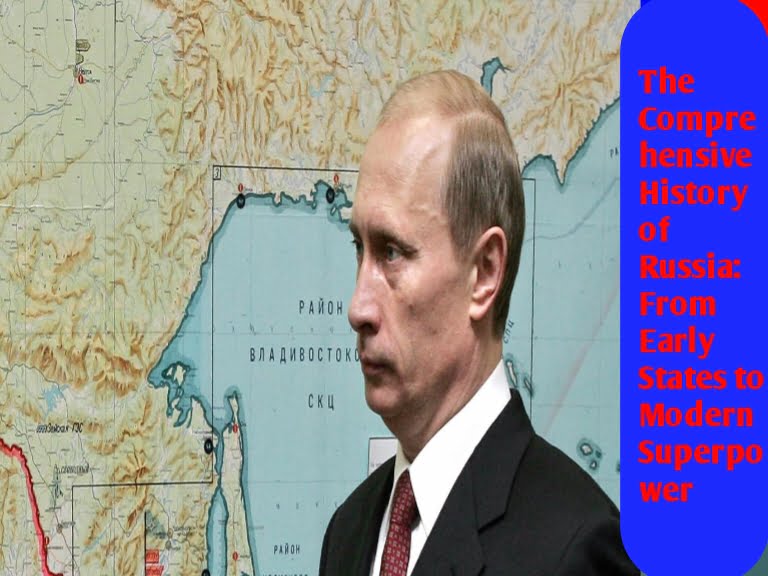The Comprehensive History of Russia: From Early States to Modern Superpower
The Comprehensive History of Russia
Russia, a vast and diverse nation stretching across Eastern Europe and northern Asia, has a history that spans over a millennium. From its origins in medieval states to its emergence as a global superpower, Russia’s history is marked by significant cultural, political, and social transformations. This article provides a comprehensive overview of Russia’s history, tracing its development from early settlements to the present day.
Early History and Kievan Rus (c. 850–1240):
- Early Settlements:
- The region that is now Russia saw early settlements of Slavic tribes and Finno-Ugric peoples. Viking traders, known as Varangians, began to interact with these tribes around the 8th and 9th centuries.
- Kievan Rus:
- The establishment of Kievan Rus, a federation of Slavic tribes, is traditionally attributed to the Varangian prince Rurik, who founded the Rurik dynasty in Novgorod around 862. The most notable ruler was Vladimir the Great, who converted to Christianity in 988, leading to the Christianization of the region. The capital of Kievan Rus was Kyiv (Kiev), which became a major center of trade and culture.
Mongol Yoke and the Rise of Muscovy (1240–1547):
- Mongol Invasion:
- In the 13th century, the Mongol Empire, under Genghis Khan’s descendants, invaded Kievan Rus. The Mongols, known as the Golden Horde, ruled over the Russian territories for nearly two centuries, a period often referred to as the “Mongol Yoke.”
- Rise of Muscovy:
- During Mongol rule, the Grand Duchy of Moscow (Muscovy) gradually emerged as a powerful state. Ivan III (Ivan the Great) significantly expanded Muscovy’s territory and reduced Mongol influence. His grandson, Ivan IV (Ivan the Terrible), was crowned the first Tsar of Russia in 1547, marking the beginning of the Tsardom of Russia.
Tsardom of Russia and the Romanov Dynasty (1547–1917):
Reading more…. The History of Israel: From Ancient Roots to Modern Nationhood
- Expansion and Reforms:
- The Tsardom of Russia saw significant territorial expansion, including the conquest of Siberia. The Romanov dynasty began with Michael I in 1613, after the Time of Troubles—a period of political instability.
- Peter the Great and Westernization:
- Peter the Great (reigned 1682–1725) is known for his extensive reforms aimed at modernizing Russia and transforming it into a major European power. His efforts included the establishment of St. Petersburg as the new capital and the expansion of the Russian Navy.
- Catherine the Great:
- Catherine the Great (reigned 1762–1796) continued Peter’s policies of modernization and expansion. Her reign is noted for significant cultural development and the further expansion of Russian territories.
- 19th Century Challenges:
- The 19th century was marked by internal challenges, including serfdom, which was only abolished in 1861 under Alexander II. The period also saw the rise of revolutionary movements and increasing discontent among the population.
Russian Revolution and Soviet Union (1917–1991):
- Russian Revolution (1917):
- The Russian Revolution of 1917 led to the overthrow of the Romanov dynasty and the end of Tsarist rule. The February Revolution led to the establishment of a provisional government, but the October Revolution, led by the Bolsheviks under Vladimir Lenin, resulted in the establishment of a communist government.
- Civil War and Formation of the Soviet Union:
- The Russian Civil War (1917–1922) pitted the Red Army (Bolsheviks) against the White Army (anti-Bolsheviks). The Red Army’s victory led to the formation of the Soviet Union in 1922.
- Stalinist Era:
- Joseph Stalin’s rule (1924–1953) was marked by industrialization, collectivization of agriculture, and widespread purges. The Great Terror of the late 1930s saw massive political repression and the execution of perceived enemies.
- World War II and Superpower Status:
- The Soviet Union played a crucial role in the defeat of Nazi Germany during World War II, suffering immense losses but emerging as one of the world’s two superpowers alongside the United States. The post-war period saw the establishment of Soviet influence over Eastern Europe and the onset of the Cold War.
- Decline and Fall of the Soviet Union:
- The 1980s saw growing economic stagnation and political reform under Mikhail Gorbachev’s policies of perestroika (restructuring) and glasnost (openness). These reforms, coupled with rising nationalist movements, led to the dissolution of the Soviet Union in 1991.
Post-Soviet Russia (1991–Present):
- Early Post-Soviet Period:
- The 1990s were marked by significant economic and social upheaval as Russia transitioned from a centrally planned economy to a market economy. The privatization of state assets led to economic hardship for many and the rise of oligarchs.
- Putin Era:
- Vladimir Putin, who became president in 1999, has played a central role in modern Russian politics. His tenure has been marked by efforts to restore Russia’s global influence, economic recovery, and increased centralization of power. His presidency has also seen conflicts with neighboring countries, such as the wars in Chechnya and the annexation of Crimea in 2014.
- Contemporary Issues:
- Russia faces various challenges, including economic sanctions, political dissent, and geopolitical tensions with Western countries. Domestically, issues such as corruption, human rights abuses, and political repression are also prevalent.
Conclusion: The history of Russia is a tapestry woven with a diverse array of cultural, political, and social threads. From its early beginnings in Kievan Rus to its role as a global superpower, Russia’s journey reflects its complex and multifaceted identity. As it continues to navigate the challenges of the 21st century, Russia’s rich history remains a crucial part of its national narrative and global position.
How did you like the information given in our article today, please tell us in the comment section and for more such posts, follow our page The News House, thank you
